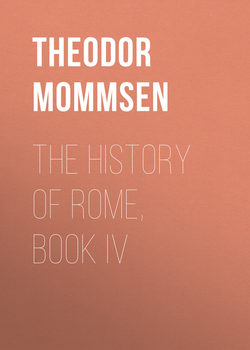The History of Rome, Book IV

Реклама. ООО «ЛитРес», ИНН: 7719571260.
Оглавление
Theodor Mommsen. The History of Rome, Book IV
Chapter I. The Subject Countries Down to the Times of the Gracchi
Chapter II. The Reform Movement and Tiberius Gracchus
Chapter III. The Revolution and Gaius Gracchus
Chapter IV. The Rule of the Restoration
Chapter V. The Peoples of the North
Chapter VI. The Attempt of Marius at Revolution and the Attempt of Drusus at Reform
Chapter VII. The Revolt of the Italian Subjects, and the Sulpician Revolution
Chapter VIII. The East and King Mithradates
Chapter IX. Cinna and Sulla
Chapter X. The Sullan Constitution
Chapter XI. The Commonwealth and Its Economy
Chapter XII. Nationality, Religion, and Education
Chapter XIII. Literature and Art
Отрывок из книги
The Subjects
With the abolition of the Macedonian monarchy the supremacy of Rome not only became an established fact from the Pillars of Hercules to the mouths of the Nile and the Orontes, but, as if it were the final decree of fate, it weighed on the nations with all the pressure of an inevitable necessity, and seemed to leave them merely the choice of perishing in hopeless resistance or in hopeless endurance. If history were not entitled to insist that the earnest reader should accompany her through good and evil days, through landscapes of winter as well as of spring, the historian might be tempted to shun the cheerless task of tracing the manifold and yet monotonous turns of this struggle between superior power and utter weakness, both in the Spanish provinces already annexed to the Roman empire and in the African, Hellenic, and Asiatic territories which were still treated as clients of Rome. But, however unimportant and subordinate the individual conflicts may appear, they have collectively a deep historical significance; and, in particular, the state of things in Italy at this period only becomes intelligible in the light of the reaction which the provinces exercised over the mother-country.
.....
But by far the larger portion of the city still remained standing. We may believe that Scipio desired its preservation; at least he addressed a special inquiry to the senate on the subject. Scipio Nasica once more attempted to gain a hearing for the demands of reason and honour; but in vain. The senate ordered the general to level the city of Carthage and the suburb of Magalia with the ground, and to do the same with all the townships which had held by Carthage to the last; and thereafter to pass the plough over the site of Carthage so as to put an end in legal form to the existence of the city, and to curse the soil and site for ever, that neither house nor cornfield might ever reappear on the spot. The command was punctually obeyed. The ruins burned for seventeen days: recently, when the remains of the Carthaginian city wall were excavated, they were found to be covered with a layer of ashes from four to five feet deep, filled with half-charred pieces of wood, fragments of iron, and projectiles. Where the industrious Phoenicians had bustled and trafficked for five hundred years, Roman slaves henceforth pastured the herds of their distant masters. Scipio, however, whom nature had destined for a nobler part than that of an executioner, gazed with horror on his own work; and, instead of the joy of victory, the victor himself was haunted by a presentiment of the retribution that would inevitably follow such a misdeed.
Province of Africa
.....